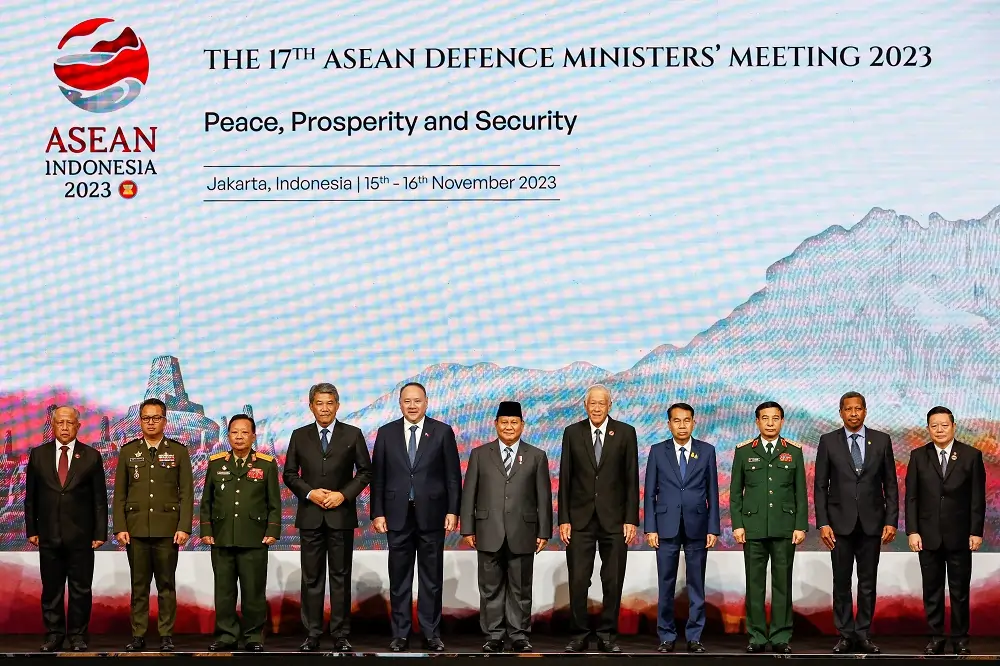
JAKARTA (Reuters) -Defence ministers in ASEAN called for an immediate ceasefire in Gaza and a durable solution to the crisis in Myanmar during the opening of a regional meeting in Jakarta on Wednesday.
Defence ministers from the Asian bloc are attending the 2-day meeting alongside key players in the Indo-Pacific as major powers jostle for regional influence, and as conflicts deepen from Myanmar to the Middle East.
Opening the annual get-together, Indonesian Defence Minister Prabowo Subianto said the world’s largest Muslim-majority nation was deeply saddened by the deteriorating conditions in Gaza, particularly the “horrid” humanitarian situation.
“Indonesia’s stance is clear and firm. We push and call for immediate cessation of hostilities and the immediate setting up of corridors for humanitarian assistance,” he said in his opening remarks.
Visiting Washington this week, Indonesian President Joko Widodo pressed U.S. President Joe Biden to do more to end Israel’s war with Hamas.
Malaysian Defence Haji Mohamad bin Haji Hasan reiterated the calls for an immediate ceasefire in Gaza, saying that Malaysia “condemns terrorism in all forms”, including taking people as hostages and the bombing of civilian homes.
As chair of the Association of Southeast Asian Nations (ASEAN) this year, Prabowo also urged his counterparts to push for concrete progress toward a peaceful solution in Myanmar, which has been riven by chaos and violence since a 2021 coup.
The annual meeting comes as conflict rages in the Middle East and Ukraine and as tensions ratchet up in disputed waters in the South China Sea, where China is accused of aggression against the Philippines, which has U.S. backing and seeks to boost its military ties with Japan.
It also comes as Myanmar’s generals are facing their biggest test this week since taking power in a 2021 coup, with insurgent groups battling the junta gathering momentum in several parts of the country, including the states of Rakhine and Chin.
In a joint declaration, the defence ministers also urged “all parties concerned” to cease all violence in Myanmar and urged “full implementation” of the ASEAN “Five-Point Consensus” peace plan agreed to in 2021.
The defence ministers also underscored the need to maintain peace in the South China Sea and to exercise “self-restraint in the conduct of activities that would complicate or escalate disputes and affect peace and stability.”
They also reiterated a commitment to implement the Code of Conduct in the South China Sea, which China and ASEAN countries agreed to create in 2002.
All ASEAN defence ministers, with the exception of Myanmar’s, attended Wednesday’s forum, with U.S. Defence Secretary Lloyd Austin to meet counterparts later in the day.
The talks will expand on Thursday to include Russia, China, Japan, South Korea, India, New Zealand and Australia.
ASEAN, a region of about 660 million people with a combined gross domestic product of more than $3.2 trillion, has for years been courted by Washington and Beijing, but their fierce rivalry has caused its members concern.
“Competition is good. But competition should not deteriorate into a zero-sum game,” Indonesia’s defence minister and presidential candidate Prabowo Subianto told a foreign policy forum this week, where he stressed the importance of non-alignment.
Air Lieutenant General Jing Jianfeng, deputy chief of staff of the Joint Staff Department of China’s Central Military Commission, will represent China. The country removed its defence minister in October, raising questions about the stability of the leadership around President Xi Jinping.
Austin comes to Indonesia from South Korea, where he reiterated concerns about Russia and China helping North Korea to evade sanctions and Moscow’s closer military ties with Pyongyang.
Aaron Connelly, senior fellow at the International Institute for Strategic Studies in Singapore, said conflict in Gaza and Ukraine and China’s moves to block Philippine resupply missions at a disputed reef will most likely feature at the meeting.
“This forum is not one where major geopolitical developments are really addressed or moved forward in any significant way. But we do expect discussions from the U.S. and Philippines on topics like the Second Thomas Shoal, Israel-Hamas, Ukraine,” Connelly said.
(Reporting by Stanley Widianto and Ananda Teresia; Additional reporting by Kanupriya Kapoor; Writing by Martin Petty and Kate Lamb; Editing by Gerry Doyle)


